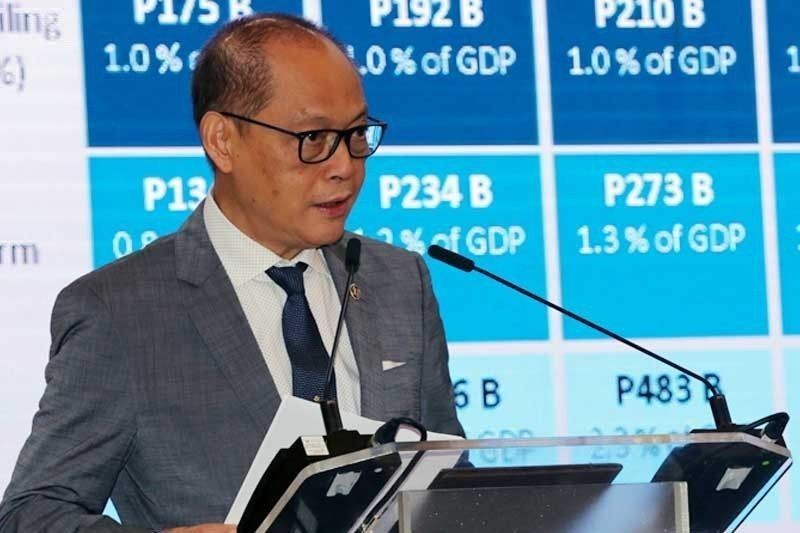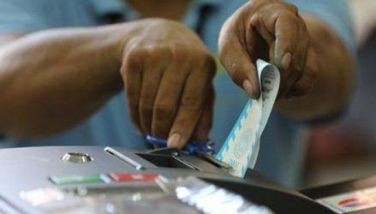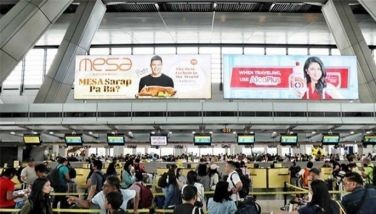Diokno must explain insertions, underspending before House

MANILA, Philippines — Aside from explaining why government “underspending” reached a whopping P1.3 trillion, Budget Secretary Benjamin Diokno should also bring with him to Congress “pertinent documents” regarding allegations of insertions in the P3.7-trillion national budget for 2019.
Diokno will be facing the House of Representatives oversight committee tomorrow afternoon during the “Question Hour.”
Last week, the plenary adopted House Resolution 2307 requiring the appearance and participation of Diokno in the Question Hour over the 2019 national budget.
As a result, House Majority Leader Rolando Andaya Jr. (Camarines Sur) – himself a former budget minister during the time of former president and now Speaker Gloria Macapagal-Arroyo – sent Diokno the House summons.
“Further, you are also required to bring all pertinent documents such as disbursements, releases and office memos addressed to all government offices, among others,” Andaya said.
Minority Leader Danilo Suarez (Quezon) said the “Question Hour” will be the first under the leadership of Arroyo in the House.
Suarez said it is part of their congressional powers to conduct legislative inquiries and exercise oversight functions.
Suarez stressed the importance of Diokno’s appearance in the Question Hour, noting that “issues regarding budget insertions arise, thereby raising the possibility of having a re-enacted budget for 2019.”
As practiced by previous Congresses, the Question Hour is known to be a period of confrontation initiated by the legislative to hold the executive department, particularly Cabinet secretaries, accountable for their acts and the operation of the government.
Suarez, along with more than 40 members of the opposition bloc comprising the House Oversight Committee, stressed “the slow disbursement of government agencies must be addressed.”
Rep. Antonio Bravo of party-list Coop-Natcco revealed that underspending is now pegged at P1.3 trillion. He added that records show as of 2017, P220 billion has not been released. “Now, there’s no report of savings.”
Suarez said there are five most problematic agencies when it comes to disbursements, among them the Departments of Public Works and Highways (DPWH), Health (DOH), Agriculture (DA), Education (DepEd) and Social Welfare and Development (DSWD).
“We call on the DBM to appear before the House to explain and correct the irregularities in the implementation of the 2018 budget and in the proposed 2019 budget. We need a cohesive government that will put forth the public’s welfare,” he said.
Why single out congressmen?
Militant lawmakers welcomed Sen. Panfilo Lacson’s crusade against pork barrel funds but advised him to be more circumspect. They said Lacson’s colleagues have in fact allocated bigger pork barrel funds for themselves, more than the congressmen did.
No less than Andaya himself, who was indirectly accused by Lacson of allocating P1.9 billion for his district in Camarines Sur, confirmed last week that senators have allocated for themselves more than P8 billion in pork barrel funds.
If computed by the current 22 senators – excluding Lacson who refuses to get his entitlement and Alan Peter Cayetano who was appointed foreign secretary before he resigned last October – this means each of them got at least P363.6 million each.
Traditionally, all 24 senators are entitled to P200 million each as their priority development assistance funds on a yearly basis, while congressmen – who are now about 293 – are given at least P70 million each.
“Maybe it’s fair that (senators) reveal how much they inserted in the budget and where did they put the money,” Andaya said.
Andaya refused to specify the projects of senators and from what regions. “I would rather prefer that they would say it,” he said.
Lacson maintained the amendments made by lawmakers on the proposed P3.757-trillion national budget should have first passed through the regional development councils (RDCs).
This is to make sure the added projects are truly beneficial to communities where they are to be implemented, he said.
Lacson warned the projects may end up useless as they appear to have been inserted in an “indiscriminate, whimsical, and arbitrary” manner.
He explained the budget preparation by the executive branch—particularly the process of proposing projects to be funded—starts from the barangay level, to the municipal or city government up to the RDCs that include representatives from non-government organizations for transparency and to ensure they are what are needed by communities.
The list of projects is then submitted to concerned national government agencies for “vetting.”
“But what happens during the period of amendments (in Congress), they (lawmakers) take turns making insertions for their projects and this is where there is a disconnect: the needs and priorities of the (local government units) are not reflected in the national budget,” Lacson told dzBB yesterday.
He said there were occasions when the implementing agency was not aware of all its projects because of the amendments to the budgets made by lawmakers. – With Paolo Romero
- Latest
- Trending





























